Introduction
Marius Trésor. Monument.
Marius Trésor, idol to a whole generation of football fans, forever changed the history of the Girondins with his performances on and off the field.Contenu
Titre
Girondins de Bordeaux
Heading
Titre 2
Corps de texte
In the collective memory, the great Marius Trésor will remain forever associated with the Girondins de Bordeaux. But the legendary defender only actually played four full seasons for the club. But what seasons they were... Trésor played here from 1980 and 1984, and he's been a Girondin ever since…
Image
Image
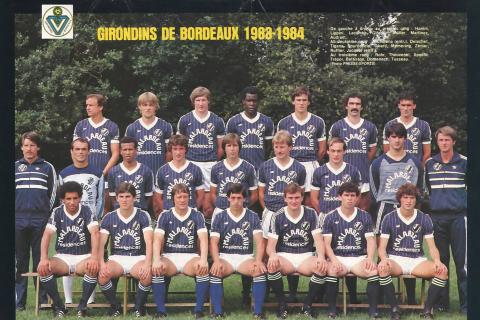
Titre
A man of his word
Heading
Titre 3
Image
Image
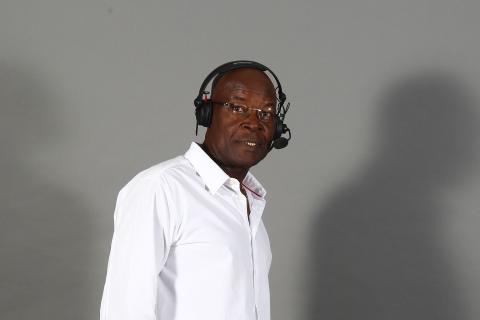
Corps de texte
Coach, manager, supervisor, commentator, even press officer... but before all that, Marius Trésor was a footballer. And what a footballer! A legend of international standing. A mode, a benchmark, a guiding star.
Marius joined Bordeaux from Olympique de Marseille (where he won the Coupe de France in 1976, but where things became difficult in his final season as the club was relegated to Division 2) in 1980, along with François Bracci – a fellow France international – and Jean Fernandez, as well as René Girard (Nîmes Olympique) and Aimé Jacquet (Olympique Lyonnais). Forming a central defensive partnership with Bracci, he was a natural fit for a Bordeaux squad featuring Thouvenel, Rohr, Giresse, Lacombe Gemmrich and Soler, to name but a few. Surrounded by seasoned international and rising stars, his performances were of the very finest order. An impressive second wind for a player the wrong side of thirty, whom many down on the south coast had dismissed as being over the hill…
After an aborted transfer to F.C. Bayern Munich and a few months on the sidelines, he was back and better than ever with Bordeaux. Marius deserves most of the credit himself, of course, but it is only fair to salute the intelligence of club president Claude Bez and the coaching staff, who believed in him. The deal they offered Trésor was simple: a basic contract where he would be paid per match played, renewable at the end of each season. And by the end of that first season, Bordeaux would be in Europe for the first time in a decade!
Image
Image
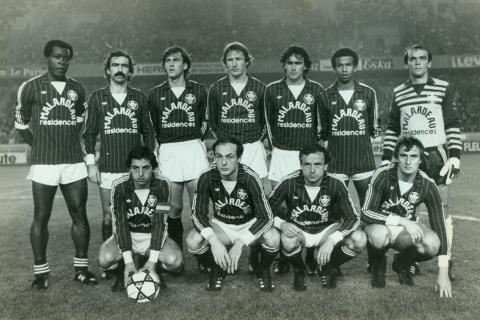
Titre
Trophy time
Heading
Titre 3
Corps de texte
His first game for Bordeaux was a starting appearance at Lescure against the famous Saint-Étienne side featuring France internationals Patrick Battiston, Gérard Janvion, Bernard Gardon, Christian Lopez, Michel Platini, Jean-François Larios, Jacques Zimako and Laurent Roussey, on 24th July 1980. The game ended 3-0 to Bordeaux, but Les Verts would nonetheless go on to win the championship that season…
Image
Image
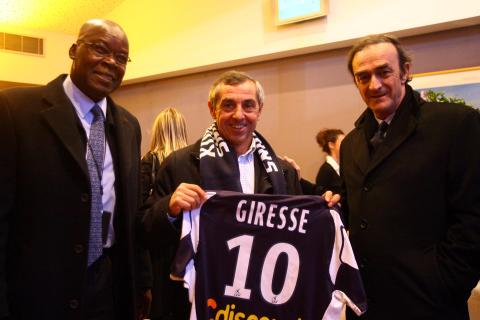
Corps de texte
During his first season in Gironde, the boy from Guadeloupe who had enjoyed chart success with his tropical hit "Sacré Marius" in 1978, was once again under the spotlight. Bordeaux finished third that year behind A.S. Saint-Étienne (1st) and F.C. Nantes (2nd), qualifying for the UEFA Cup! Marius was back at the top table, and was once again a regular in the national squad. Meanwhile, the level of ambition here in Bordeaux had increased considerably. With Pantelić, Kourichi, Tigana, Specht, R. Domenech, D. Müller, Tusseau, Zénier, Hanini and more joining the adventure, the Girondins were fast becoming a formidable force…
In 1982 the Girondins finished fourth, and in 1983 they moved up to second. That famous white V on the navy blue shirt was tantalisingly close to becoming a V for victory… The triumph finally came in 1984, when Bordeaux brought home the league title at the end of an exhilarating, suspense-filled season. The Girondins finished with the same number of points as Monaco, taking the trophy on goal difference! This was just the second league title in the club's history, the first having come way back in 1950.
The Girondins were no longer simply a decent team: they were a winning machine built for battle. And for glory.
Image
Image
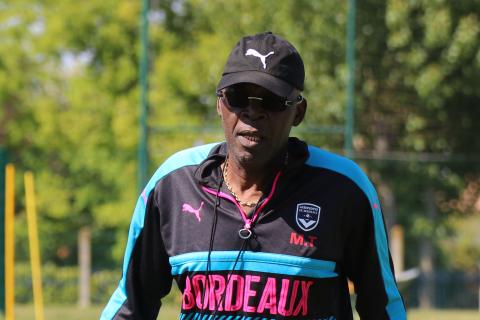
Titre
European adventures
Heading
Titre 3
Corps de texte
The club was also gradually emerging as a force on the European scene. Giresse, Trésor and co. cruised past Icelandic champions Vikingur Reykjavik, with Marius Trésor scoring one of the eight goals Bordeaux fired in over the two legs. But the Girondins made it no further than the last 16 in 1981-1982, knocked out by a Hamburg side (who would go all the way to the final) featuring Franz Beckenbauer, Horst Hrubesch, Manfred Kaltz and Caspar Memering…
The Girondins went one better the following season, but lost out in the quarter-finals to C.S. Universitatea Craiova. But there were encouraging signs in the previous rounds, when Bordeaux got the better of F.C. Carl Zeiss Jena and H.N.K. Hajduk Split, two solid and much-feared clubs from the old Eastern bloc. In 1983-1984 it was back to square one, as the Girondins lost their vey first tie against F.C. Lokomotive Leipzig. The two clubs would meet again soon…
But that was to be Marius' final European campaign as a Girondins player. Beset by recurring injuries to his back and knees, requiring several operations, he did not make it to the end of the season. His final appearance for the Girondins came on 19th November 1983 in Bastia. Bordeaux won 3-1 that evening, a victory which proved to be an unexpected send-off for this most charismatic, classy, powerful and professional of players. Not to mention a warm, humble and popular personality, then as now.
Titre
Last man standing
Heading
Titre 3
Image
Image
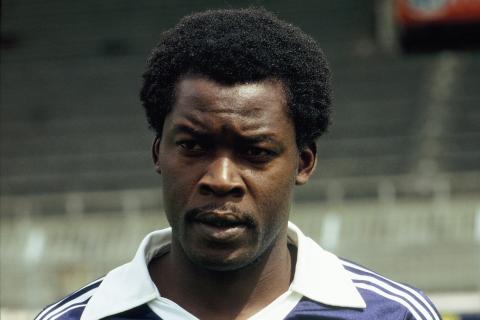
Corps de texte
After all these years, Marius is still defined by the values which made him such a success with Bordeaux and Les Bleus, as he explained to us recently:
"I hung up my boots in 1984, but even towards the end of my career I still approached every match the same way. Every time I set foot on that pitch I was determined to give everything, to make sure my team conceded as few goals as possible, to be the last man standing. I couldn't do that without the help of my team-mates: not just the other defenders, the whole team. A team only works if everybody is pulling their weight. You often hear it said that attack is the best form of defence, and defence the best form of attack... So we always gave it our all to get that result, even if the opposition had other ideas... Nevertheless, every time I set foot on the pitch I went out there with conviction and determination. I went out there to win."
And in the most fitting sign-off possible, on the final day of his final season Bordeaux beat Rennes (the starting XI that day: Christian Delachet, Léonard Specht, Jean-Christophe Thouvenel, Gernot Rohr, Patrick Battiston, Raymond Domenech, René Girard, Caspar Memering, Jean Amadou Tigana, Dieter Müller, Bernard Lacombe)* to claim the league title. For the first and only time in his career in France, Marius was in a championship-winning team!
Image
Image
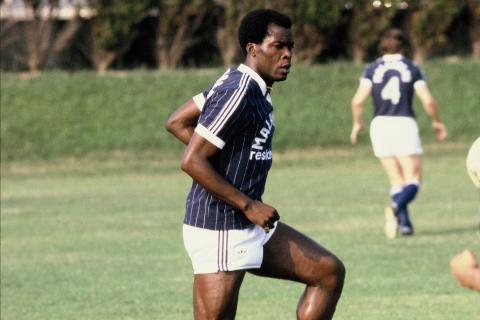
Corps de texte
Marius' impact on the game was such that in 2004 he was named among the 100 best players in the history of football by FIFA. His playing days in Bordeaux ended with a record of 116 appearances and 5 goals in all competitions, but he has been a regular presence at Le Haillan ever since, always with the same passion, loyalty and love of Bordeaux.
*The squad that season also featured Michel Audrain, Denis Bourdoncle, Bernard Gimenez, Alain Giresse, Hassan Hanini, Bruno Lippini, Antoine Martinez, Richard Ruffier, Thierry Tusseau and Bernard Zénier.
Titre
Marius Trésor and Les Bleus
Heading
Titre 2
Titre
A national Trésor
Heading
Titre 3
Corps de texte
For a few years, Marius Trésor was the France team. Or vice versa. In fact, in some parts of the world Marius Trésor was France's most famous export. In the collective imagination, the ultimate Marius moment will always be that headed goal against Brazil in 1977, in a friendly played at the legendary Maracanã de Rio de Janeiro, the high temple of global football…
Not to forget that volley smashed past West German keeper Harald Schumacher in the semi-final of World Cup 1982… But what about the countless decisive tackles, as precise as they were physically impressive? The enduring image of Marius is that of a total athlete, an imposing, muscular presence marshalling the defence in short shorts and socks down over his ankles, with no shin pads in sight!
Marius Trésor, what memories, what images, what a career! A childhood hero to a generation, and a model of success through hard work too. It all started at Juventus de Sainte-Anne, in Guadeloupe, where young Marius played as a striker. He then moved to Corsica to join A.C. Ajaccio, spent eight seasons with Olympique de Marseille and finally rounded out his career with the Girondins de Bordeaux.
Throughout that time, and ever since, he has embodied a certain romantic idea of the game, a mixture of hard work and panache with just a dash of French chivalry.
Above all, he was one hell of a defender. Marius started out on the left hand side with the national side, but he really made his name as a formidable sweeper.
Image
Image
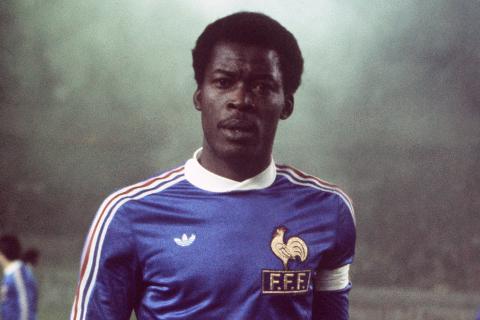
Titre
"The black wall"
Heading
Titre 3
Corps de texte
After a brief spell in the France youth team in 1971, he was called up to the senior squad for the Euro 1972 qualifying campaign. He started against Bulgaria at Sofia's Vasil-Levski Stadium on 4th December of that year, in front of a crowd of 18,000 spectateurs.
Georges Carnus, Jean Djorkaeff, Henri Michel, Bernard Bosquier, Jacques Novi, Georges Lech, Michel Mézy, Bernard Blanchet, Hervé Revelli, Charly Loubet, Louis Floch and Georges Bereta were also on the team sheet that day, but that impressive line-up was not enough to prevent Bulgaria winning the game (2-1/Blanchet got the French goal). France did not make it to Euro 1972, but Marius' international career had begun. And there was much more to come…
The following year saw him form a new central defensive pairing with Jean-Pierre Adams, a promising young player from Nîmes Olympique. Their first appearance together was in Brazil, during a 0-0 friendly with Argentina on 25th June 1972. They clearly had all the making of a "formidable" defensive pairings, and indeed a few years and many matches later the duo had become so impenetrable that they were known as the "black wall," widely held up as a model of defensive power.
As the 1970s gave way to the 1980s, Marius played alongside a wealth of talent including Maxime Bossis, Gérard Janvion, Christian Lopez, Patrice Rio, Philippe Mahut and Yvon Le Roux, as well as his fellow Girondins François Bracci, Patrick Battiston, Raymond Domenech and Léonard Specht.
Titre
Marius the hero!
Heading
Titre 3
Image
Image
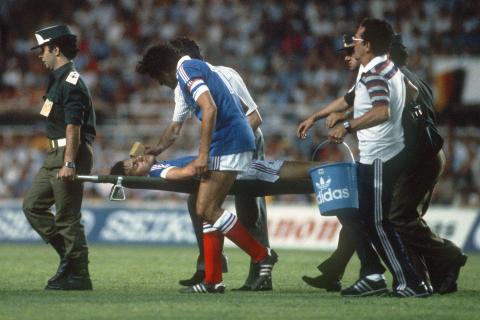
Corps de texte
After the disappointment of World Cup 1978 in Argentina, which saw France bow out in the first round, not to mention the failure to qualify for the 1970 tournament in Mexico (as well as Euro 1972, Euro 1976 and Euro 1980)*, Trésor finally had the opportunity to play at a major tournament. By this time he was 32, and a long career at the top was beginning to take its toll in terms of injuries, but Marius was still as solid as they come. France coach Michel Hidalgo placed his faith in Trésor, and that decision paid off.
The results speak for themselves: Trésor started all 7 of France's matches, wearing the capatin's armband for 3 of them (including one game against Kuwait where he took over as captain when Michel Platini was subbed off). France finished fourth in that tournament, a heroic performance from a team featuring René Girard, Alain Giresse, Bernard Lacombe, Gérard Soler, Jean Amadou Tigana and Patrick Battiston (A.S. Saint-Étienne), the latter of whom would join Marius at Bordeaux the following month.
But of course, the moment which everybody remembers from that semi-final is Trésor's truly spectacular volleyed goal, connecting with a cross from Alain Giresse for a goal which should have been enough to knock out West Germany (92e/2-1). But of course the Germans equalised in extremis, and the game went to a penalty shoot-out which has since gone down in history (3-3, 5 -4 on pens). Nevertheless, Trésor had confirmed his position as a national hero, a powerful symbol of sporting passion, national pride and footballing genius on a par with Platini (who scored the first goal that evening) and Giresse (who scored the third, in the 98th minute). That semi-final was a game of momentous, Shakespearian drama - surely Trésor would rise again as the hero destined to avenge the tragedy... Unfortunately, destiny had other plans.
Image
Image
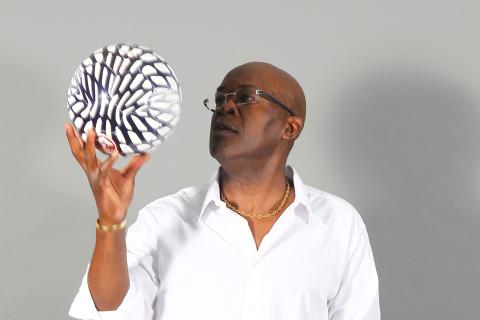
Titre
The man, the legend
Heading
Titre 3
Corps de texte
That defeat still stings, despite the happy memories of that astounding goal. As Marius himself puts it: "Every time somebody mentions it, I always say that it was our fault that France didn't make the World Cup final for the first time in 1982. We got so close... But I think we lived up to the occasion, against a West German team who were clear favourites. Luck just wasn't on our side that night... It'll never be a happy memory for me, that game, because we got knocked out..."
Painful though it may have been, that night of high drama will forever remain a defining moment in the history of French football. The experience also served to solidify the mental and physical strength of that legendary French squad, paving the way for their triumph at Euro 1984. And of course their 3rd-place finish at World Cup 1986 in Mexico… without Marius, but still powered by the spirit of solidarity and commitment he helped to instil. Values which have always defined this gentleman footballer, a sporting legend whose aura and popularity endure.
65 caps, 4 goals and 23 captain's armbands: from his first appearance in 1971 until his last in 1983 (he held the record for most caps from 1983 until 1990), there was not a year in which Marius Trésor did not play for his country. Thirteen years! A magnificent record and a magnificent career. And although he missed out (just) on France's trophy-winning triumph, his monumental reputation and enduring contribution to the game are beyond dispute.
*Marius Trésor would surely have been selected for Euro 1984, held in France, if he hadn't announced his retirement a few weeks previously, finally succumbing to a series of injuries.
Image
Image

Libellé
Marius Trésor's trophy cabinet (Bordeaux)
Corps de texte
French Champions 1984
D1 runners-up 1983.
Libellé
Marius Trésor's trophy cabinet (France)
Corps de texte
Fourth place in World Cup 1982
World Cup 1978
65 caps and 4 goals between 1971 and 1983
Captained France 23 times
Held the record for most caps from 5th October 1983 until 24th January 1990. He took the record from Roger Marche (63), before being overtaken by Manuel Amoros (82).
Named in the FIFA 100 in 2004.
Background Section Club
Activé